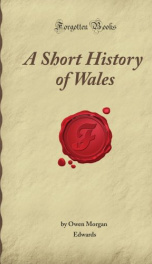wales

Purchase of this book includes free trial access to www.million-books.com where you can read more than a million books for free. This is an OCR edition with typos. Excerpt from book: THE WELSH KINGS With the death of Cadwaladr, the struggle for the recovery of the north was given up for ever. For the next six hundred years the struggle is a different one; it is between a king who regarded himself as the champion of the unity of the Britons, wearing " the crown of Arthur," and the princes who were descended from the tribal kinglets. The chief source of information concerning the attempt at uniting Wales is the " Chronicle of the Princes." The earliest copy of it we possess was written during the first half of the fourteenth century, probably at the Cistercian abbey of Strata Florida in Ceredigion. It begins, as it ends, with the loss of a crown; it begins with the loss of the " crown of Britain," it ends in the midst of the war which caused the loss of the crown of Wales. It is full, picturesque, and generally trustworthy. The loss of the north brought with it the temporary destruction of the central power. For half a century the princes remained independent. The weakness ofNorthumbriafor the Picts had stormed Dumbarton, and had annihilated the Northumbrian army at Nechtansmere, in 686made common action against her unnecessary. But the rise of another power forced them to turn to Rhodri Molwynog, the grandson of Cadwaladr, for defence. Mcrcia rose, during the eighth century, under three able kingsEthelbald, Offa, and Cenwulf. As the chief political power had passed from the north to Wales, it passed also from Northumbria to Mercia. On opposite sides of the Severn the two rivals rose Wales under Rhodri Molwynog, Mercia under Ethelbald. The two kings died in 755, and left very different successors. Rhodri Molwynog was succeeded by his two sons, Conan and Howel, who fought against each other, and allowed the princes to destroy each other, o...
Info about the book
Author:
Series:
Unknown
ISBN:
1444471961
Rating:
5/5 (1)Your rating:
0/5
Languge:
English
Users who have this book
Users who want this book
What readers are saying
What do you think? Write your own comment on this book!
write a commentGenre
if you like wales try:
Do you want to exchange books? It’s EASY!
Get registered and find other users who want to give their favourite books to good hands!




